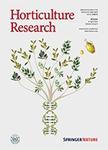The RhHB1/RhLOX4 module affects the dehydration tolerance of rose flowers(Rosa hybrida)by fine-tuning jasmonic acid levels
作者机构:Department of Ornamental HorticultureCollege of HorticultureChina Agricultural UniversityBeijing 100193China Crop Research InstituteGuangdong Academy of Agricultural SciencesGuangdong Provincial Key Laboratory of Crop Genetic ImprovementGuangzhouGuangdong 510642China
出 版 物:《Horticulture Research》 (园艺研究(英文))
年 卷 期:2020年第7卷第1期
页 面:1852-1864页
核心收录:
学科分类:090706[农学-园林植物与观赏园艺] 0907[农学-林学] 09[农学]
基 金:funded by the National Key R&D Program of China(2018YFD1000407) the Construction of Beijing Science and Technology Innovation and Service Capacity in Top Subjects(CEFFPXM2019_014207_000032)
主 题:flowers rose conclusion
摘 要:Phytohormones are key factors in plant responsiveness to abiotic and biotic stresses,and maintaining hormone homeostasis is critically important during stress *** rose(Rosa hybrida)flowers experience dehydration stress during postharvest handling,and jasmonic acid(JA)levels change as a result of this ***,how JA is involved in dehydration tolerance remains *** investigated the functions of the JA-and dehydration-induced RhHB1 gene,which encodes a homeodomain-leucine zipper Iγ-clade transcription factor,in rose *** RhHB1 decreased petal dehydration tolerance and resulted in a persistent increase in JA-Ile content and reduced dehydration *** elevated JA-Ile level had a detrimental effect on rose petal dehydration ***1 was shown to lower the transient induction of JA-Ile accumulation in response to *** addition to transcriptomic data,we obtained evidence that RhHB1 suppresses the expression of the lipoxygenase 4(RhLOX4)gene by directly binding to its promoter both in vivo and in *** propose that increased JA-Ile levels weaken the capacity for osmotic adjustment in petal cells,resulting in reduced dehydration *** conclusion,a JA feedback loop mediated by an RhHB1/RhLOX4 regulatory module provides dehydration tolerance by fine-tuning bioactive JA levels in dehydrated flowers.



